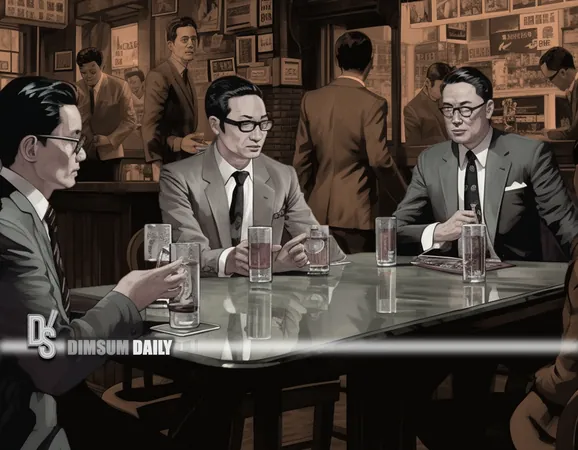
The Illusion of Opulence: Hong Kong’s Millionaires Trapped in Mental Poverty
2024-12-17
Author: Ken Lee
Hong Kong is often hailed as a glittering city of opportunity, but beneath its façade lies a striking paradox: a hub of millionaires ensnared in mental poverty. With a population of eight million, this city has become a high-stakes game where success is measured not just in wealth but in existential dread.
Each evening, neon lights illuminate the somber realities of urban life, contrasting sharply with the lifestyles of its youthful elites. In affluent bars, junior bankers spend lavishly on expensive whiskey after grappling with the anxiety that comes from falling short of their HK$2 million bonuses. Meanwhile, on the fringes, elderly vendors scavenge for a meager HK$50 a day, clutching lottery tickets and placing their hopes on the next big biotech initial public offering. This is more than a tale of materialism; it’s a narrative of a society clubbed by collective insanity wrapped in designer labels.
Stark statistics reveal a city rife with paradoxes. Hong Kong boasts the world’s highest concentration of ultra-high-net-worth individuals—those with fortunes exceeding US$30 million. Yet 94% of these wealthy individuals report feelings of financial insecurity, struggling with invisible fears of future poverty despite their lavish lifestyles. It’s distressing to witness wealth becoming a source of insomnia rather than comfort, with millionaires in luxury mid-level penthouses tortured by thoughts of inadequacy.
This unsettling phenomenon transcends bank balances. The pursuit of wealth has created an ecosystem where financial advisors double as therapists, consoling clients who wish they had capitalized on the latest real estate boom. Exclusive retreats help affluent residents master mindfulness, ironically, while they check stocks during meditation sessions. The struggle for personal fulfillment becomes a lost cause in a land overflowing with materialistic ideals.
In high-end clubs, the elite pour over their HK$10,000 bottles of wine, claiming, “Business is terrible.” Their concerns aren’t limited to dollar signs; they reveal a deeper truth about a society that exchanges life satisfaction for financial gain. The relentless pursuit of wealth has birthed an inherent madness, where personal connections are severed by overdue trading hours, children equate love with luxury brands, and even romantic relationships are turned into mere financial transactions.
It’s a tragic irony that the very ancestors of today’s wealthy sought refuge from poverty, only for their descendants to become entrapped in an all-consuming quest for affluence that often leaves them poorer in spirit. This unique cultural phenomenon presents a dark twist on Hong Kong’s renowned entrepreneurial spirit: a relentless addiction masquerading as ambition.
Yet the tide is slowly beginning to shift. Some of Hong Kong’s most affluent are challenging the status quo. Young professionals are starting to favor modest living arrangements over ostentatious mansions; they’re not shirking success but redefining it. They find joy in living simply, absorbing wisdom from ancient philosophies rather than merely chasing the next financial uptick.
These shifts are indicative of a subtle revolution. Influencers and high-profile figures are increasingly adopting sustainable lifestyles and purpose-driven careers, challenging the narrative of conspicuous consumption. A property heiress launched a zero-waste store, while a former investment banker now cultivates urban farming, revealing that wealth can enrich lives without imprisoning them.
Reforming the obsession with accumulation isn’t about rejecting wealth altogether; it’s about cultivating a healthier relationship with it. The new pragmatists still operate in a world of investments and properties, but they embrace the idea of “enough.” They understand that material excess does not equate to satisfaction.
This new mindset is emerging among the youth, who bear witness to their parents’ relentless toil, and the anxiety that fills the city. They desire careers that foster both purpose and profit—an approach that’s wise, not naïve. The future of Hong Kong lies not in forsaking its entrepreneurial zeal but harnessing it with intentionality. The focal point has shifted: it’s not merely about creating wealth—it’s about ensuring wealth does not overshadow true fulfillment.
In conclusion, as Hong Kong grapples with this complex duality of wealth and mental poverty, the call for a redefined concept of success grows stronger. The city’s next generation stands poised to lead this transformation, recognizing that in a world rich with opportunities, prioritizing well-being alongside financial achievements could ultimately restore the spirit of Hong Kong.

 Brasil (PT)
Brasil (PT)
 Canada (EN)
Canada (EN)
 Chile (ES)
Chile (ES)
 España (ES)
España (ES)
 France (FR)
France (FR)
 Hong Kong (EN)
Hong Kong (EN)
 Italia (IT)
Italia (IT)
 日本 (JA)
日本 (JA)
 Magyarország (HU)
Magyarország (HU)
 Norge (NO)
Norge (NO)
 Polska (PL)
Polska (PL)
 Schweiz (DE)
Schweiz (DE)
 Singapore (EN)
Singapore (EN)
 Sverige (SV)
Sverige (SV)
 Suomi (FI)
Suomi (FI)
 Türkiye (TR)
Türkiye (TR)